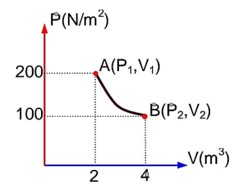Thermodynamics
Get insights from 325 questions on Thermodynamics, answered by students, alumni, and experts. You may also ask and answer any question you like about Thermodynamics
Follow Ask QuestionQuestions
Discussions
Active Users
Followers
New answer posted
6 months agoContributor-Level 10
Millimoles of HCl = 200 * 0.2 = 40
Millimoles of NaOH = 300 * 0.1 = 30
Heat released =
Mass of solution = 500 * 1 g
= 500 g
Specific heat of water = 4.18 Jg-1 K-1
Ans. = 82
New answer posted
7 months agoContributor-Level 10
For spontaneous process
For Isobaric process;
For Isothermal process;
reaction =
Taking an Exam? Selecting a College?
Get authentic answers from experts, students and alumni that you won't find anywhere else
Sign Up on ShikshaOn Shiksha, get access to
- 66k Colleges
- 1.2k Exams
- 686k Reviews
- 1800k Answers


